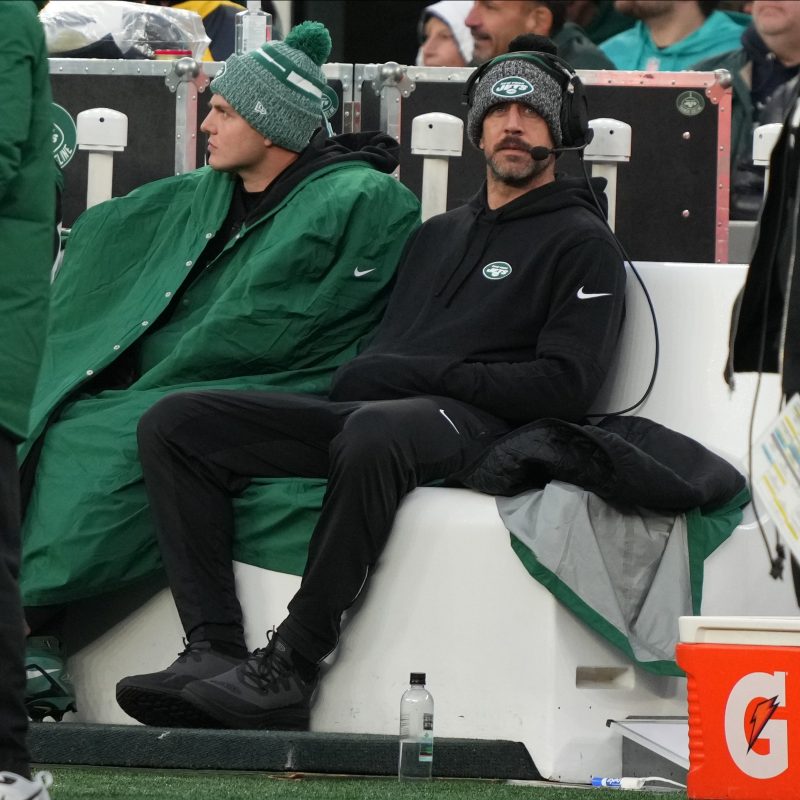Instead of being the savior the New York Jets envisioned, Aaron Rodgers might well set them back.
Rodgers said Tuesday he’s still trying to come back this season, even after Friday’s abysmal showing against the Miami Dolphins. The Jets aren’t making the playoffs. They’re not even finishing with a winning record. Yet Rodgers is determined to give false hope to a team that’s been going nowhere fast since four snaps into its first game.
What the Jets need is a reality check, a head start on next season — including a solid backup plan if a 40-year-old quarterback goes down — and as high a draft pick as they can get. A Rodgers’ return could jeopardize all of that.
“Once I’m healthy, and that’s where we’re at, (it’s) are we alive? Are we in it? Can I help the team, not hurt the team, by being out there?” Rodgers said during his weekly appearance on The Pat McAfee Show.
The short answer to all of these questions is no.
NFL STATS CENTRAL: The latest NFL scores, schedules, odds, stats and more.
Two of the Jets’ last three games are against the Washington Commanders and New England Patriots. Not exactly stiff competition for a four-time NFL MVP, even one who turns 40 on Saturday and is trying to knock off the rust.
But whatever momentum boost Rodgers would give the Jets with a late resurgence isn’t going to carry over to next season. He’s not going to show coach Robert Saleh or offensive coordinator Nathaniel Hackett anything they don’t already know about him and what he can do. Wins against the other dregs of the NFL aren’t going to reveal some big secrets or previously untapped talent that will carry the Jets to the Super Bowl next season.
At best, it would lull the Jets into thinking they’d have been fine if only Rodgers had stayed healthy and allow them to ignore the glaring flaws in their plan. Like not having a legitimate backup quarterback. Or failing to shore up the offensive line.
At worst, Rodgers costs the Jets a better draft pick than the No. 8 slot they have now. And in the very worst-case scenario, which isn’t far-fetched given New York’s second-to-last game is against the Cleveland Browns and quarterback-terrorizer Myles Garrett, Rodgers jeopardizes his health — and his availability for next season.
It’s not worth it for either of them. No matter how much Rodgers has needed a goal to get him through the dark days that followed his injury.
“I’m thankful to have something to look forward to every day, and that’s the rehab and getting better and doing something special. Whether or not I come back this year, it’s been a lot of lessons and a lot of things I’m thankful for in the midst of some really frustrating and sad times,” Rodgers said.
It made sense for the Jets to be on board with Rodgers’ comeback plan so long as there was hope there would be something of the season left to salvage when he returned. But the last glimmers of that are gone. It’s time to acknowledge reality.
No one could have foreseen Rodgers shredding his Achilles on the Jets’ first drive of their season opener, so it might seem a bit unfair to quibble with some of the moves Woody Johnson and Joe Douglas made to entice one of the best to play the game to come to New York.
Like hiring Hackett, his good friend from Green Bay, a move that’s turned out oh, so well. Or giving a jaw-dropping $22 million in guaranteed money to Allen Lazard, who has 20 catches and one TD this season and was a healthy scratch Friday. Or signing Rodgers’ close friend Randall Cobb, who has been inactive for five of New York’s 11 games.
But those first two moves have been almost as damaging to the Jets’ season as Rodgers’ injury. Especially when considering some of that money the Jets gave to Lazard could have been used to shore up the offensive line. Or get a decent veteran QB who could help Rodgers mentor Zach Wilson and be a serviceable option should the emergency glass have to be broken.
Which it did. Obviously.
The Jets must use the rest of this year to take a clear-eyed look at their squad and their needs this offseason, and it cannot be done through Rodgers’ lens. Don’t think about who he wants to add or what he could do with what the Jets already have.
Make decisions based on what is best for the Jets, both next season and beyond. Because as the Jets learned the hard way, there’s no guarantee how long Rodgers will be around.
Losing Rodgers cost the Jets the season. Getting him back could cost them even more.
Follow USA TODAY Sports columnist Nancy Armour on social media @nrarmour.






